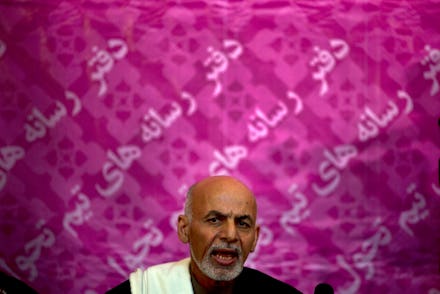The Frontrunner to Be Afghanistan's Next President Has a Strong Message About Democracy

Election officials are now in the process of counting the more than 7 million votes of Afghanistan’s presidential election. As the United States scales back its military presence, President Karzai leaves office after 13 years in power and the population faces continued threats from the Taliban, this election has a lot at stake.
The candidate currently in the lead, Ashraf Ghani Ahmadzai, stands out for his radically hands-on approach to fixing the weak state.
The Columbia University-educated technocrat and former World Bank official is effectively running against the two other strongest candidates: Abdullah Abudullah, Karzai’s rival in the 2009 elections, and Zalmai Rassoul, the country’s former Foreign Minister. While Ghani has since solidified his platform in the media as the advocate for a new kind of development after running in 2009 and again this year, a TED talk he gave in 2005 gives us perhaps the most unfiltered take from the presidential hopeful.
Ghani’s TED talk, called "How to Rebuild a Broken State," was decisively blunt. In it, he described what he calls a a rare moment of "consensus" in which most of the world agrees that capitalism and democracy are the best forms of economic and political power, respectively.
But Ghani’s capitalism isn’t the kind you might expect. In perhaps a rare moment of true criticism on the TED stage, Ghani urged Western influencers to re-think their way of approaching Afghanistan, or any other failed state. On the Western design for development, Ghani said, "You’re great designers, but your designs are selfish, it’s for your own immediate use."
He calls technical assistance the worst kind of development. Why? In his own words, millions of dollars are being funneled to leaders "who are incapable of thinking creatively, or organically."
Instead, Ghani called for his Western audience, and viewers from around the world to think creatively. When it comes to corruption, Ghani warns Afghan leaders and Western-allies from waiting until corruption simply disappears. A true re-building process for Afghanistan requires initiatives that work with corrupt officials and even the Taliban in its peace process.
Ghani wants to throw away traditional economic plans for his country simply because, according to him, they won’t work: "Economics taught at most elite universities are practically useless in my context. My country is dominated by drug economy and a mafia. Textbook economics does not work in my context."
Neither does unrestricted aid. Adding to the growing discussion that the "aid machine," or the way humanitarian aid is carried out from the developed world to the developing world, Ghani rejects aid as a model for re-building Afghanistan: "A dollar of private investment, inmy judgment, is worth 20 dollars of aid, in terms of the dynamic it generates."
This is coming from a man who worked with the United Nations and the World Bank to secure millions in aid funding for the country. For Ghani, aid can only do so much. "Trade is the key, not aid," he said. "If you want [Afghanistan] to be able to compete with China and to attract investment, we could ... if there was zero tariffs."
Afghanistan will soon learn who is to be its new president. Regardless of the result, it’s important to note how monumental this election has been. From the voter turn-out to radically new plans put forth by Ghani, Afghanistan is changing.